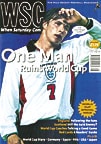 A lot can be learnt from England's World Cup performance, and not just on the footballing side of it
A lot can be learnt from England's World Cup performance, and not just on the footballing side of it
At the risk of prompting a wave of cancelled subscriptions, your old pals at WSC have to admit that in some respects we enjoy the World Cup more when England aren’t in it.
This has something to do with being able to remember a time when football wasn’t ubiquitous, when it existed for the benefit of those who were interested in it, but didn’t intrude into the lives of everyone else. Nothing could support the weight of expectation heaped upon France 98 months before it started, and if England had not been there we might at least have been spared some of the crowing boorishness that surrounded the tournament.
It was apparent even during the ad breaks. A nasty, xenophobic stench hung around the commercials for one of the official sponsors, Vauxhall, in which foreign fans, players and managers were dubbed with voices and “dialogue” that would have been rejected as too crude in ’Allo ’Allo. Worse still was the extraordinary beer commercial in which a group of supporters walk into a pub intending to watch a World Cup game but discover Vinnie Jones sitting by himself in front of the TV. He snarls at the group who back off immediately. The message was stark: respect the hard man, otherwise he may lose control – and it will be your fault if he does.
Many England fans, not the majority but still more than just the hooligan fringe, took this confrontational attitude with them to France. Determined not to adapt in any way to wherever they happen to be, they welcome the “provocation” that gives them the chance to demonstrate their toughness. And they keep receiving what could easily be construed as messages of support. Alongside the usual blather about the “shame” supposedly heaped on the nation by the fighting, the Sun produced a highly ambiguous front page on June 16th headlined Two–Nil, below which were pictures of Alan Shearer and one of the fat boneheads arrested in Marseille, two Englishmen making an impact at the World Cup given equal prominence.
In other papers, some of the fans who were subsequently arrested were shown wearing Sun bowler hats that had been distributed outside the bars in Marseille before the trouble started. Yet Des Lynam and sports minister Tony Banks were photographed wearing the same hats in the paper’s build-up to subsequent England games. Banks will have had official approval for his stunt, given that the government is only too keen to cuddle up to Rupert Murdoch, but why should the BBC have allowed their main presenter to be aligned with a paper that was bound to take the most chauvinistic approach to reporting the World Cup?
Another reason for feeling ambivalent about England is the team itself, characterized during Glenn Hoddle’s reign by petulance, immaturity and a refusal to acknowledge any fault – much the same tendencies displayed by the followers of the hooligans. The instinctive response of many fans in Marseille to blame someone else for provoking an English reaction was to be mirrored by the David Beckham incident which undermined England on the pitch. Beckham’s dismissal was the low point of a bad night for the quartet of England players, Ince, Batty and Shearer being the others, who most frequently cross the line between legitimate aggression and intimidation and are also among the most reluctant to accept criticism.
Shearer, above all, seems to have cultivated a narky persona which refuses to engage with reasonable criticism or even normal standards of social interaction, as demonstrated by his leaden interviews in the build-up to England games. It fell to Shearer to explain the game where each player had to work a song title into his interview, which he did with obvious relish. True, the questions asked are almost invariably banal, but the open refusal to take them at all seriously showed a contempt for the viewer as well as the interviewer.
Shearer’s sullen demeanour is matched by the man who made him captain. Glenn Hoddle plainly does not rate communication as one of the jobs of an international manager. His habit of giving out deliberately misleading information about injuries and his fatuous insistence that every selection he made was preplanned left him open to attack from those who might otherwise have given him the benefit of the doubt.
Equally, his spiky, humourless manner left him with no reserves of affection when things went wrong on the pitch, dulled the enthusiasm generated by elements of the team’s performance and did nothing to counter the poisonous legacy left by a faction of England fans wherever they went.
England’s inability to admit defeat gracefully and depart with a semblance of dignity was familiar and wearisome enough. But the air of malice around England’s campaign now seems set to continue into the domestic season in a new form – the ritual hounding of David Beckham. It might be tempting to respond that those who live by the hype also run the risk of dying by it, but not when some people seem to think that’s what he literally deserves.
Neither football nor England should matter that much.
From WSC 138 August 1998. What was happening this month